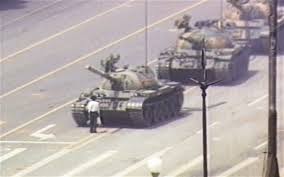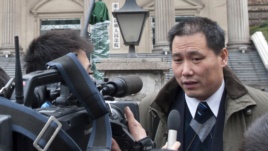It has been 25 years since the June 4 massacre in Beijing, when Chinese troops with tanks and armoured cars stormed into Tiananmen Square killing and arresting thousands of unarmed pro-democracy protesters. Some received long sentences and are still imprisoned, while every year the government continues to detain and imprison dissidents.
A million people had taken part in the demonstration in Tiananmen Square, millions more in cities nationwide, demanding an end to official corruption and calling for political reforms. According to a 1998 report by Amnesty International, since the crackdown, the party has refused to release official death toll figures, publicly investigate the killings or review the cases of those still imprisoned. It is estimated that over 250 people are still imprisoned, although the number could be much higher than the cases identified. Many of those were convicted of “counter-revolutionary” offences which since 1997 are no longer crimes under Chinese law. However, the cases of people serving sentences for “counter-revolutionary” offences have not yet been reviewed.
Today, whilst commemorating the 25th anniversary of the seven-week protests (starting in mid-April), the authorities have already arrested Pu Zhiqiang, a rights lawyer, after accusing him of “creating a disturbance” while attending a seminar that called for an investigation into the crackdown. Four other activists – Xu Youyu, Liu Di, Hao Jian and Hu Shigen – who took part in that event have been detained on the same grounds.
Chinese authorities also announced the detainment of prominent journalist Gao Yu on charges of leaking a confidential state document, according to Xinhua, China‘s main state news agency. “It’s unclear what document led to her detention,” said Maya Wang, a researcher in Hong Kong for Human Rights Watch, “But the case highlights the dangerously vague Chinese state secrets law, in which the designation of state secrets is broad and ill-defined, and can’t be legally challenged in courts”.
Several other activists have been questioned by police, including Zhang Xianling and Ding Zilin whose sons were killed in the crackdown. Separately, a court in Shenzhen handed down a 10-year prison sentence to Hong Kong-based publisher, Yao Wentian, who has already been detained, last year while preparing to publish a book by a dissident author.
The opposite path was granted to the activist, Xu Wanping, who was released early from prison after serving nine years of a 12-year sentence for “inciting subversion of state power.” Xu, who claimed not have changed his political stance, has been deprived of his political rights for the next four years, as confirmed by the organisation Human Rights in China.
In the meantime, the world’s first Tiananmen massacre museum opened its doors in Hong Kong, on April 26. Sponsored by the Hong Kong Alliance in Support of the Patriotic Democratic Movements of China, the new 800-square-foot museum features a collection of artefacts, written documents and nearly 1,000 archival photographs. Despite local opposition (two companies threatened legal action, citing violations of the property deed and anticipated disturbance caused by a high volume of visitors), the organisers managed to take advantage of the quasi-autonomous territory of Hong Kong which is expected to receive 45 million tourists from the mainland this year. “A lot of people have forgotten what has happened and mainlanders are not allowed to remember,” Cheuk-yan Lee, Chairman of the Alliance, told Al Jazeera, as it is still forbidden to discuss the events of 1989.






 Print
Print Email
Email